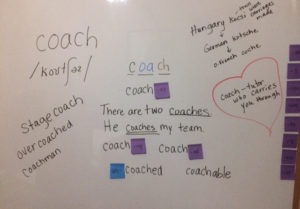A Sweet Insight Brought by Coach
Last night at the end of a session, a sweet insight was brought by coach but that meaning was missed for a while. A student misread coach. When asked how she would use it in a sentence, she described it as someone who leads your soccer team. Looking at the word’s structure, it’s a base without affixes. So our next step was to look at its origin and relatives using Etymonline to see what we could learn from its story.
1550s, ‘large kind of carriage,’ from Middle French coche (16c.), from German kotsche, from Hungarian kocsi (szekér) ‘(carriage) of Kocs,’ village where it was first made. In Hungary, the thing and the name for it date from 15c., and forms are found in most European languages (Spanish and Portuguese coche, Italian cocchino, Dutch koets). Applied to railway cars 1866, American English. Sense of ‘economy or tourist class’ is from 1949.
Meaning ‘instructor/trainer’ is c. 1830 Oxford University slang for a tutor who ‘carries’ a student through an exam; athletic sense is from 1861. A more classical word for an athletic trainer was agonistarch, from Greek agonistarkhes ‘one who trains (someone) to compete in the public games and contests.'”
When we started reading the entry neither of us were thinking of the vehicle type of coach mentioned in the first paragraph. The word was named for the town where coaches were made in Hungary. We could see the Modern English spelling evolved from French coche.

“Do you think a coach, like a soccer coach, is related to the word describing Cinderella’s carriage?” I asked. She looked at me shaking her head doubtfully. I agreed. Even though they are spelled the same, we thought they likely came from different roots.
Then we read on to the second paragraph. I read the highlighted sentence aloud twice. How awesome! So a teacher or tutor (coach) is like the transportation type of coach in the sense that they “(carry) the student through an exam,” supporting and empowering the student. Then she smiled, pointing at me, and said, “That’s you.” What a sweet insight about coaches, tutors, teachers, parents. These are moments that melt your heart and make the prep and study worthwhile.
We also noted that this word can be used as a noun or a verb, can be suffixed, and compounded. Stagecoach was interesting. We discovered that the stage base added to coach has to do with traveling without resting through a “stage” of the journey.
My student noted that we have to use the suffix <-es> since a syllable is added when it becomes /coʊtʃəz/. She also reminded me that spelling the initial /k/ with a <c> works because there is no <e,i, or y> following it. This is something she has come to understand just recently. We had noted earlier that <oa> is one of the spellings for the /oʊ/ (long o) phoneme.

When we finished studying this one word, we had read and spelled several other words, discussing quite a few concepts. I thanked her for choosing it because I learned something that is really motivational for me in my work with my students. She said, “Yeah, I did that, didn’t I?” Today we both did a little carrying.
Click here for Coach: A Structured Word Inquiry resource.
Happy Coaching!

